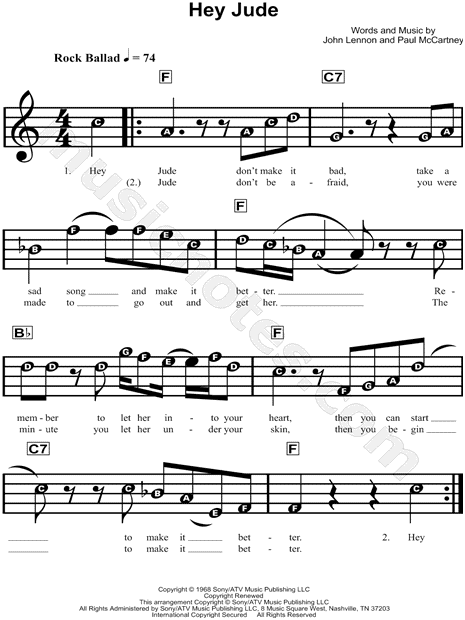

Hey (F) Jude, don’t make it (C) bad Take a (C7) sad song and make it (F) better Re (A#)member to let her under your (F) skin Then you’ll be (C)gin to make it (F) Better better better better better better, oh… OUTRO (F7) So let it out and let it (A#) in, hey (Dm) Jude, Be (Gm)gin you’re waiting for (C7) someone to per (F)form with (F7) And don’t you know that it’s just (A#) you, hey (Dm) Jude, you’ll (Gm) do The movement you (C7) need is on your (F) shoulder (F7) Na na an (C7) na na na na na na yeah…. The song was recorded at the request of producer Phil Spector, who added the string arrangement that became one of the song’s trademarks.Hey (F) Jude, don’t let me (C) down You have (C7) found her, now go and (F) get her Re (A#)member to let her into your (F) heart Then you can sta (C)rt to make it (F) better CHORUS 2 The original title was “Hey Jules,” but McCartney changed the name to “Jude” because it sounded better. Originally, McCartney wrote the song to console Lennon’s son, Julian, during his parents’ divorce. It has been covered many times by artists from different musical genres, making it a timeless and universal song.The song also has an interesting story behind it. The song was also critically acclaimed and is often considered one of the best songs of all time. The song’s lyrics are a call for comfort and hope, encouraging a person to overcome their sorrows and move forward.“Hey Jude” was a huge commercial success, topping the UK charts for two weeks and topping the US Billboard Hot 100 for nine weeks. The song gains momentum as the drums and electric guitar come in, creating a crescendo that culminates in a powerful and memorable chorus. The song was recorded in July 1968 at Abbey Road Studios, with the participation of studio pianist Nicky Hopkins.The song begins with a slow, melancholy piano introduction, which is then joined by McCartney’s voice.

It was written by Paul McCartney in response to John Lennon’s separation from his wife Cynthia. “Hey Jude” is an iconic song by British rock band The Beatles, released in 1968.


 0 kommentar(er)
0 kommentar(er)
